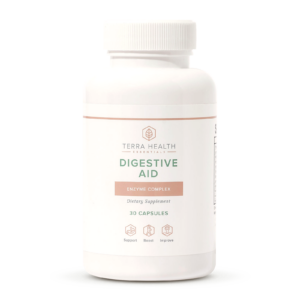..Most people have experienced digestive issues at some point in their lives, but the root causes of these issues can greatly differ. Stomach bloat, heartburn, and nausea are all commonly associated with problems in the gastrointestinal tract. However, the complexity of this system can lead to many misconceptions about how the digestion process works. Leading to confusion about what is causing these symptoms in the first place.
We’re going to debunk some digestive myths that are so common you may get a few surprises!
 1. Chewing Gum Takes 7 Years to Reach Full Digestion
1. Chewing Gum Takes 7 Years to Reach Full Digestion
How many times did your Mom warn you not to swallow your gum as a kid? Probably quite a few! This is such a commonly held belief that it creates genuine concern for people when they accidentally swallow some gum. This concern probably arose from the fact that our bodies don’t have enzymes that can break down the insoluble gum. But don’t worry, it’s highly unlikely that your Wrigleys Extra is going to hang around in your gut for 7 years.
According to Duke gastroenterologist Nancy McGreal, most of us will empty our stomachs around 30 – 120 minutes after eating any kind of food – including chewing gum. Chewing gum might stick to almost everything it touches outside your body but it doesn’t stick to your intestinal tract. So if you’ve swallowed some gum over the years you can stop panicking – your stomach lining isn’t coated with it! Chewing gum moves through your digestive system and is excreted in the same way any other food
 2. Cooked Food Makes Digestion Easier
2. Cooked Food Makes Digestion Easier
This is something you don’t say to a raw foodie unless you want a massive lecture! But it’s still a widely (and wrongly) held belief. The reality is that your digestive system is designed to break food down so that your body can absorb the nutrients it needs. This process will happen regardless of whether the food is cooked or uncooked. In fact, overcooking can sometimes destroy some of those nutrients!
 3. Food is Digested in the Stomach
3. Food is Digested in the Stomach
This is half true. Some digestion takes place in the stomach but the digestive process has a number of stages. The fact is that the digestive process begins the moment you taste food in your mouth and start to chew. The better you chew your food, the easier it is for your digestive enzymes to do their job later.
Once you swallow your food, it’s pushed down your esophagus to your stomach in a process called peristalsis. This triggers the opening of the entrance to the stomach. The acid in your stomach then helps to kill any microbes and a few specific enzymes that work within this acidic environment start breaking up proteins. But the real work happens in your small intestine. Digestive enzymes break down carbohydrates, fats, and proteins, into sugars, fatty acids, and amino acids, so they can be stored and passed into your bloodstream.
When they enter your bloodstream, these nutrients get stored as fat or burned as energy. Down in the large intestine, large food molecules such as fiber and other complex carbohydrates are then broken down by gut microbes. This entire process takes place in your gastrointestinal tract also referred to as your “gut”. So, as you can see, the stomach only plays one part!
4. Food Promotes Alcohol Absorption
It’s a common and true belief that you’ll get less intoxicated on a full stomach. But the reasoning behind this isn’t what you think. Food doesn’t “soak up” alcohol. It just takes your body a little longer to absorb the alcohol when it’s busy digesting and absorbing nutrients. If you drink on an empty stomach, the alcohol goes straight to your small intestine with no interruptions. This is why you’ll get drunk faster!
5. Only Celiac Sufferers Benefit From a Gluten-Free Diet
Celiac disease is the most serious type of gluten intolerance and it affects under 1% of people in the US. However, another issue called gluten sensitivity is much more common and can often be attributed to many digestive symptoms such as pain and bloating. Gluten sensitivity is not as serious as Celiac disease but it can still cause significant discomfort and should be addressed by adjusting your diet and consulting with a physician where needed.
 Give Your Gut A Helping Hand With Our Digestive Aid
Give Your Gut A Helping Hand With Our Digestive Aid
The Terra Health Essentials Digestive Aid contains a carefully formulated blend of key enzymes for optimal digestion. This highly targeted complex works fast to reduce the discomfort of gas and bloating that can occur after eating. By supplementing with digestive enzymes you will get rapid relief from the discomfort of an ill-functioning digestive system.
We are offering our blog readers a special 30% discount which you can avail of by using the code: digestionmyths30 when ordering your Digestive Aid.

